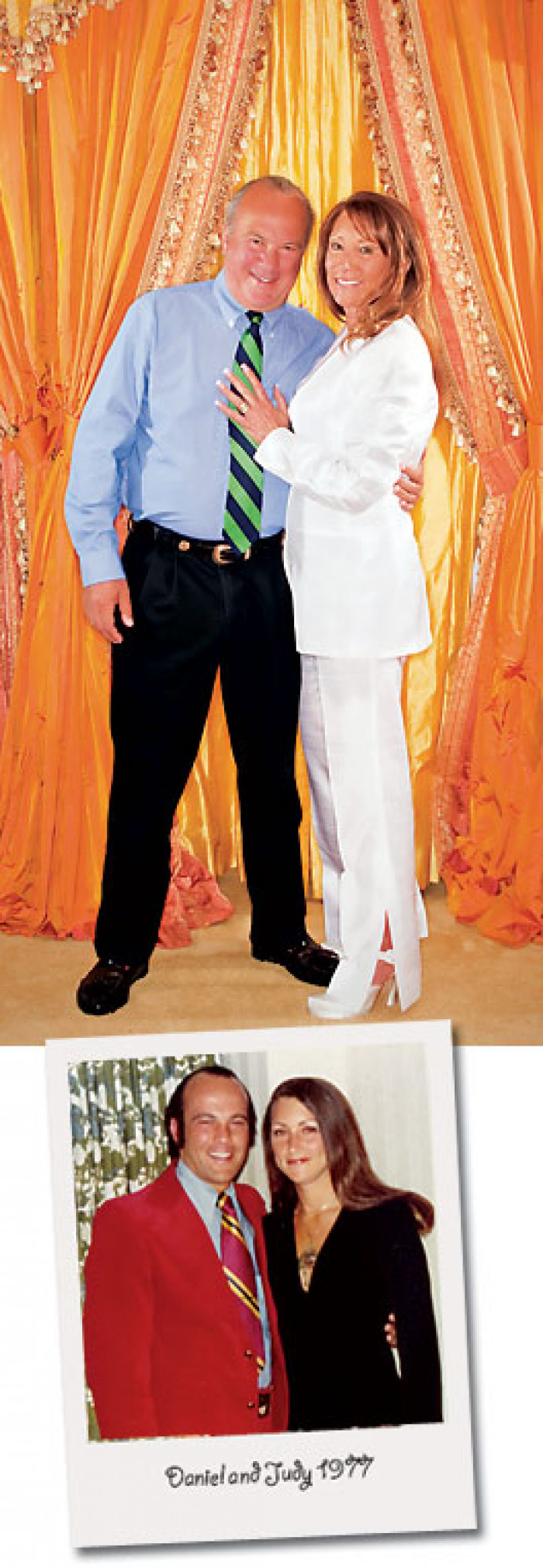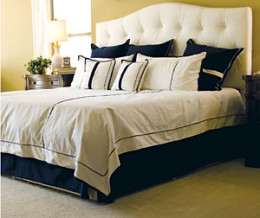SHARE:
profile: Valley Forge Fabrics
Seamless Transition for Valley Forge Fabrics
Once, fire-safety rules drove business to the Pompano Beach company that' s become the world's largest supplier of fabric to hotels. The firm now expects environmental concerns to assure its future.
Diana and Michael make it clear that their parents still run the company. But the second generation is leading Valley Forge’s latest venture, which aims at both profits and sustainability.
 Daniel and Judy Dobin started the company in 1977 in New York. They moved the business to Pompano Beach in 1992.? [Top photo: Eileen Escarda Bottom photo: Valley Forge Fabrics] |
Diana and Michael began researching the environmental aspects of their industry in 2002 to find answers to customers’ questions about recycled content and other practices. They wanted to see if Valley Forge could make money offering a line of sustainable products. The more they learned, the more intrigued they became with the potential for not only significant profit, but significant savings of water, energy and waste.
The Dobins, who have both earned professional LEED accreditations, discovered that their customers tossed all their old bedding into the garbage when they bought a new line — a practice both wasteful and costly, since hotel chains pay by the ton in landfill fees. Their research into the raw materials used to make fabrics was also an eye-opener. For example, cotton crops require heavy use of pesticides and scarce water in some of the driest parts of the world.
The company worked two years on product development, spent what Daniel Dobin describes as “an investment greater than any other endeavor we’ve ever undertaken” and rolled out two sustainable product lines. The company’s Fresh line of bedding debuted in 2007 and now makes up half of Valley Forge’s products. The material, made entirely from recycled plastic bottles, feels as soft and cozy as cotton. In 2008, the company introduced Living Fresh bedding products. Woven from eucalyptus and cotton, the material has a silky, luxurious texture.
The company developed and debuted the new lines as the global economy and the hospitality industry began their slide. Valley Forge’s revenue has dropped 26% in the downturn. But the family feels they’ve positioned the company perfectly in the meantime. The second generation could end up capitalizing by helping customers navigate the green-certification maze in the same way their parents helped hotels meet evolving fire code regulations 30 years ago: By using the Fresh products,
hotels can earn credit for LEED and the myriad green-lodging certification programs popping up across the U.S. and other parts of the world.
Another perk for customers who buy Fresh and Living Fresh bedding: Valley Forge will recycle all the fabrics that the hotels replace; much of it will end up in new pillows, duvets and other products. The Fresh fabrics are flame retardant, pass the strictest fire codes with no chemicals, and the new lines cost the same or less than traditional fabric. “People aren’t going to just buy it because it’s environmentally sustainable,” says Michael Dobin. “They’re going to buy it because it’s beautiful and meets the price points.”
The new products have drawn interest from upscale customers like the Breakers in Palm Beach — and also from retailers. Michael and Diana Dobin say they’re negotiating with six major companies that want to turn Fresh into home-bedding lines to be marketed as environmentally friendly, luxurious and inexpensive. They’re wary of moving beyond their father’s decision to focus exclusively on the hospitality industry but may partner with one of the chains.
Their parents don’t seem too worried. “Before Michael and Diana, we never would have explored recycled products, either,” Daniel Dobin says.
“We are able to learn from our children just as they are able to learn from us.”
|
Here’s a look at energy, water and other savings for 700,000 duvets (at 9 yards apiece) — the calculation was done on behalf of a major hotel chain — made with 100% post-consumer recycled polyester from plastic bottles.
- Energy: 85,280,320 fewer kilowatt hours, a savings of 66% compared to virgin polyester
- Water: 6,988,320 fewer gallons of water, a savings of 27% compared to virgin polyester
- Global warming: 21,204,160 fewer pounds of carbon dioxide being released into the air, a 46% savings compared to virgin polyester
- Toxins: 886,880 fewer pounds of dichlorobenzene, a pesticide and suspected carcinogen; a 34% savings compared to virgin polyester
Next page: More photos of Valley Forge
























